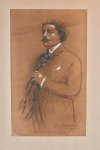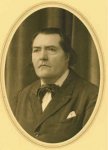LUCIEN DUROSOIR Violinist and Composer (1878-1955)
Born in 1878, Lucien Durosoir enjoyed a career as a violinist before devoting himself to composition. It was principally in Germany, where he perfected his technique with the great masters of the art, Joseph Joachim and Hugo Heermann, that his talent was first recognised. From 1899 onwards, his musical tours led him across the whole of central Europe, Russia, Germany and the Austro-Hungarian Empire. In these countries, he gave some of the first performances of works by French composers (Saint-Saëns, Lalo, Widor and Bruneau). In Vienna, for example, he performed Gabriel Fauré’s Sonata in F Major for violin and piano. Conversely, he took advantage of his French tours for first performances of great works by foreign composers: in 1899 at the Salle Pleyel Niels Gade’s Concerto in B Minor, and in 1903 at the Salle des Agriculteurs Richard Strauss’s Concerto for violin, and Brahms’s Concerto. Wherever he performed, the critics wrote about him in the most laudatory terms : « …mesmerises the audience with the elevation and spirit of his playing» (Neue freie Press, 11th January 1910). « Each piece was played with both nobility and beauty » (Wiener Mittags-Zeitung, 28th January 1910). « In Max Bruch’s Concerto, he showed the very rare attributes of tone and musical quality, and in Dvorak’s Concerto, an astonishing style and virtuosity. With these superb performances, Monsieur Lucien Durosoir has placed himself amongst the finest virtuosos of his time.» (Le Figaro, 19th May 1904). War brought a brutal end to this career : he served throughout the period in the 5th Division, which took part in some of the most bloody exchanges (Douaumont, the Chemin des Dames and Eparges).
General Mangin, who had a sense of prestige, was keen to create a quartet with Lucien Durosoir as first violin. Henri Lemoine was second violin, the composer André Caplet played viola and Maurice Maréchal played « le Poilu », a famous cello made from an ammunition crate, which bears the signatures of Foch, Pétain, Mangin and Gouraud! This instrument is currently at the musical instrument museum in the Cité de la Musique, Paris. In between his duties as foot soldier, musician, stretcher bearer and pigeon-keeper, Lucien Durosoir wrote to his mother every day and more than two thousand letters have survived. Letters which describe some of the most awful episodes of the Great War as well as the studious life of the « Mangin Quartet » musicians, letters which comment on the military hierarchy and the daily conditions of those in the trenches. On 16th May 1915, he wrote : « Dear Mother, I do not know what life holds in store for me … but if I were to die … you must take an interest in children, in musicians; take an interest in and help young violinists, this will fill your time and will be a way of making me live on ». And on 12th June of the same year : « We have just lived through ten unforgettable days, the ultimate in horror ». Lucien Durosoir and André Caplet spent these dreadful years together and their friendship was sealed just as much in the trenches as when, in retreat from the front line, they played their music together. The idea of composing became more strongly embedded in Lucien Durosoir’s mind. Thinking about the end of the war, he wrote, on 12th September 1916 : « I will begin writing music and thus grow accustomed to producing more liberal works. I’m convinced that my efforts will bear fruit ». From his demobilisation, in February 1919, he began to organise his future : there was no question of his being able to take up his career again as a virtuoso. Deeply affected by the horrors which he experienced at first hand and lived through, and somewhat disillusioned by the human race, he sought sanctuary in a far corner of France to devote himself to composition.
Between 1920 and 1949, he lived in retirement, far from Paris and artistic circles; he thus built for himself a style of composing which was very different from the trends of the time and very brave. André Caplet was not sparing with his compliments and wrote to him in 1922 : « I will talk with enthusiasm to all my friends about your quartet which I find a thousand times more interesting than anything with which the noisy group of newcomers overwhelm us ». Lucien Durosoir left about forty unpublished works, in various formats, symphonic music and chamber music, of which a sonata for piano is dedicated to Jean Doyen and a Caprice for cello and harp is dedicated to Maurice Maréchal « in memory of Génicourt, winter 1916-1917 ». From 1950 onwards, illness prevented him from continuing his work and he died in December 1955.




